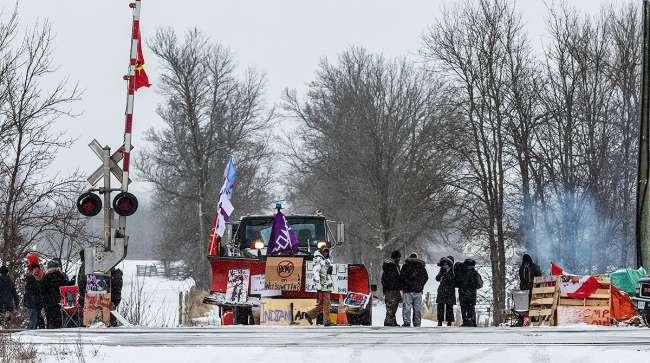Senior Reporter
CN Railroad Halts Operations as Pipeline Protests Spread

[Stay on top of transportation news: Get TTNews in your inbox.]
Canada’s largest railroad, the Canadian National Railway, is beginning a progressive and orderly shutdown of its eastern Canadian rail network, which effectively will stop all of its cross-country freight trains.
The move comes as anti-pipeline protesters have led a series of blockages that is beginning to strain the country’s supply chains and impact the nation’s economy. The protesters are using snowplows, barrels and wooden barricades to block the tracks.
In the last week, CN has canceled more than 400 trains as blockades have taken place in British Columbia, Manitoba and Ontario.
CN Initiating Progressive and Orderly Shutdown of its Eastern Canadian Network. https://t.co/X2COCBbp7w pic.twitter.com/RuOCbDV1JH — Canadian National (@CNRailway) February 13, 2020
“This situation is regrettable for its impact on the economy and on our railroaders as these protests are unrelated to CN’s activities, and beyond our control,” CEO J.J. Ruest said in a statement. “Our shutdown will be progressive and methodical to ensure that we are well set up for recovery, which will come when the illegal blockades end completely.”
Government officials in British Columbia and Manitoba have gone to court and obtained judicial orders to end the blockades. But in Ontario, the court orders have yet to be enforced and CN officials said they are being ignored.
“With over 400 trains canceled during the last week and new protests that emerged at strategic locations on our mainline, we have decided that a progressive shutdown of our eastern Canadian operations is the responsible approach to take for the safety of our employees and the protesters.”
The protests started more than a week ago when police began arresting some members of an indigenous group that had been blocking a road to a construction site for the Coastal GasLink natural gas pipeline in British Columbia. Then, indigenous groups and their supporters blocked railways and government buildings around the country in solidarity with the British Columbia group.
In a statement, the Tyendinaga Mohawks said they will continue to protest and support the Wet’suwet’en First Nations who are leading the protests against the $6 billion Coastal GasLink pipeline.
“In regards to the injunction served on the people of Tyendinaga, We the people refuse to have your laws imposed upon us. We have, and have always had, our own laws and customs, prior to, during and thereafter your attempts at genocide and assimilation,” the statement said. “A paper ordering us to vacate our land, and or allow passage of foreign goods through our territory is meaningless. We will stand our ground, and as stated, not leave until the [Royal Canadian Mountain Police] pull out of Wet’suwet’en traditional territories.”
I met with the Incident Response Group this morning to address the ongoing blockades & infrastructure disruptions across the country. We’re engaged at all levels and committed to resolving this situation quickly & peacefully to restore rail service. More: https://t.co/XqKEKhChSq — Justin Trudeau (@JustinTrudeau) February 17, 2020
The protests also are impacting passenger rail service. Via Rail, which uses much of the CN network, announced Feb. 13 it suspended most of its runs across the country until further notice, after cancellations on a smaller scale earlier.
“Unfortunately, intercity Via Rail service will be discontinued across our Canadian network. However, commuter rail services, such as Metrolinx and Exo, can keep operating so long as they can do so safely,” Ruest said. “I would like to thank our customers, international supply chain partners and industry associations for their support to get this unprecedented ordeal resolved.”
In part two of a two-part exploration of autonomous technology today, our latest RoadSigns podcast revisits conversations with Chuck Price of TuSimple and Ognen Stojanovski of Pronto.ai. Hear them discuss a palatable Level 2 version of trucking autonomy. Listen to a snippet above, and to hear the full episode, go to RoadSigns.TTNews.com.
The pipeline passes through the traditional territory of the Wet’suwet’en First Nation near Houston, British Columbia.
Prime Minister Justin Trudeau has been in Africa and Munich for the Global Security Conference. He said it is up to law enforcement to end the dispute.
“We are a country that recognizes the right to protest, but we are a country of the rule of law. And we will ensure that everything is done to resolve this through dialogue and constructive outcomes,” Trudeau said. “We are not the kind of country where politicians get to tell the police what to do in operational matters. We have professional police forces right across the country.”
CN transports more than C$250 billion annually in goods for a wide range of businesses. The Class 1 railroad operates more than 20,000 miles of track in Canada and the United States.
Want more news? Listen to today's daily briefing:



